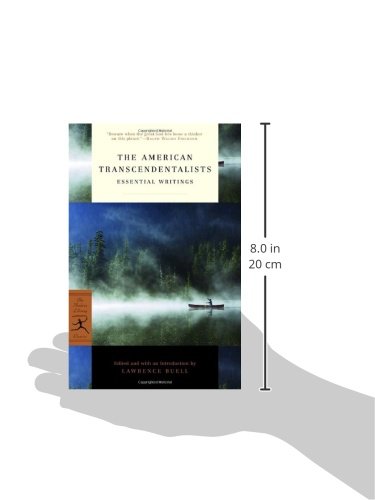Customer Services
Copyright © 2025 Desertcart Holdings Limited



The American Transcendentalists: Essential Writings (Modern Library Classics)
T**N
Good For Background But Not Essential Reading
Decent beginners overview if you're not familiar with 1800s writers or the Mass. intellectuals in particular but you should know that the two most read from the movement in modern times are Thoreau and Emerson; and that Thoreau's work influenced everyone from Ghandi Martin Luther King to Tolstoy to the freedom fighters in south Africa. So in spite of many of Thoreau's papers laying in dusty archives unpublished your time is probably best spent study him in particular and then Emerson secondarily rather than the whole movement in general. New critical works are written and published about Thoreau and Emerson each year. Thoreau acted on his ideas directly more than just giving speeches- he was ground breaking in the field of direct nature study and he and his family were part of underground railroad helping people get their freedom- just to name two examples. Emerson had many lofty idea that he didn't always directly apply in his own life- but between the two men there are enough of their own work and secondary books about them to last you a life time of reading. And their ideas about 'the movement' changed over time.
O**T
I could have skipped so many other books...
I purchased several Transcendentalism books lately, looking to learn more about this movement in American literature, politics and religion. The other books (such as "American Transcendentalism: A History" by Philip F. Gura) went on at length about various public addresses and essays, which only served to frustrate me because the writings were nowhere to be found in the book. Now I see that the other books I'd purchased may be great for an academic who wants to dwell on details and circumstances surrounding the writers in history instead of reading and feeling the actual writings themselves.To make a long story short, The American Transcendentalists: Essential Writings is exactly what it sounds like. All of the essays, public speeches, poetry, etc... discussed elsewhere are actually printed between the covers here, often in their entirety. The book has introduced me to many new writers and thinkers who I had never heard of (e.g. Theodore Parker), but will be seeking out in the future.
C**H
Chockful of thought-provoking selections
When we think of Transcendentalism, we first turn to Ralph Waldo Emerson and Henry David Thoreau. But the literary movement was made up of more personalities than just those two men; and while "Nature" and "Walden" are key writings, they're not the only examples anyone can or should read. Hence the need and attraction of any transcendental anthology: it brings us multiple voices, perhaps even some unfamiliar or unusual ones.This volume is a treasure-trove of transcendental goodies, containing more than 100 selections from 32 writers. Emerson's "Nature" and part of Thoreau's "Walden" are here, along with dozens of essays, sermons, and poems from a variety of personalities, men and women, too numerous to mention. Some pieces will be familiar to anyone who's read about the mid-1800s; others are refreshlingly new to most of us. Thanks to reading this book from cover to cover, I have discovered that I like Theodore Parker's writing quite a bit. I may have to stray off my Thoreauvian path and delve into Parker a bit more.And yet, I disagree with some of the editor's observations in this volume. Unlike Buell, I don't think Thoreau considered surveying "a day job he didn't particularly care for," and I'm fairly certain he was never a member of the American Association for the Advancement of Science. I'm also not fond of the titles Buell created for some of the selections, because that method makes it difficult to compare his anthology with others or with the original works. For example, what is labelled here as Thoreau's "Christianity and Hinduism Compared" is really a portion from the book "A Week on the Concord and Merrimack Rivers." "A Walk to Walden" by Nathaniel Hawthorne is really an excerpt from "The American Notebooks." But the sheer diversity, variety, and thematic arrangement of the selections far out-weighs any misgivings about their titling. If you are interested in transcendentalism, this is a wonderful book to start with. It's a nicely-priced paperback that's easy to carry around, which is important, because it'll take you a while to pore over and absorb (or even skip) its entries.In addition, three older anthologies of transcendental writings may interest readers: "Transcendentalism: A Reader" (Joel Myerson, ed., 2000); "The Transcendentalists: An Anthology" (Perry Miller, 1977), and "The American Transcendentalists: Their Prose and Poetry" (Perry Miller, 1957). Each anthology has a focus, and surprisingly little overlap occurs when comparing their contents. And each contains a few jewels not found in any other contemporary anthology. Happy hunting!
M**E
It's almost what I had been looking for, as ...
It's almost what I had been looking for, as It gives the reader an ample view of what that group of intellectuals wished for and meant at that time.
Trustpilot
1 day ago
1 month ago